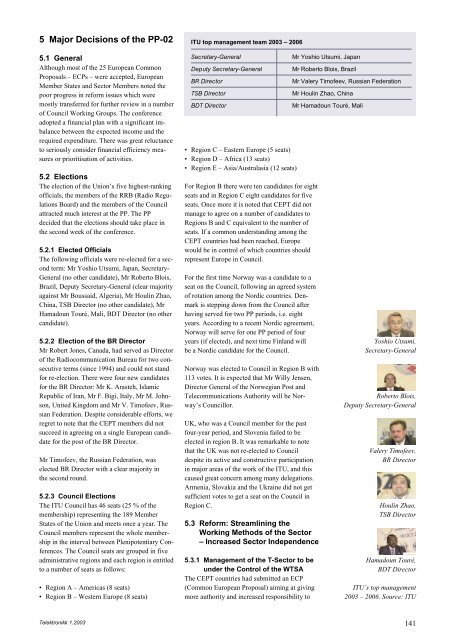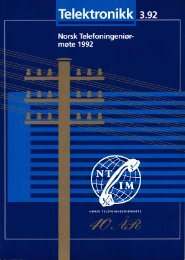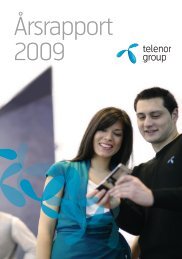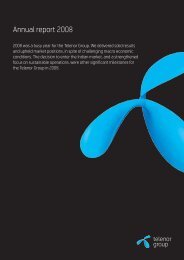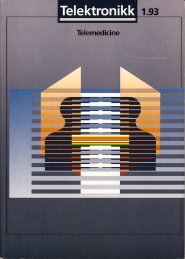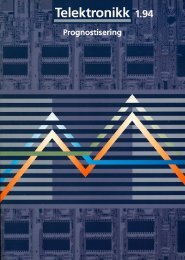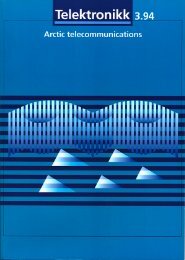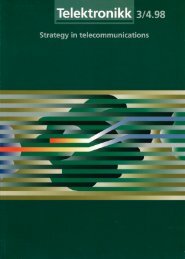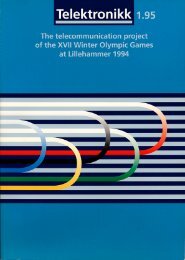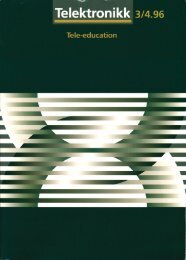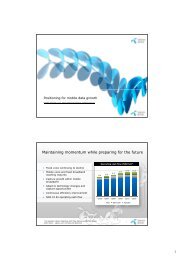Intelligent Transport Systems - Telenor
Intelligent Transport Systems - Telenor
Intelligent Transport Systems - Telenor
Create successful ePaper yourself
Turn your PDF publications into a flip-book with our unique Google optimized e-Paper software.
5 Major Decisions of the PP-02<br />
5.1 General<br />
Although most of the 25 European Common<br />
Proposals – ECPs – were accepted, European<br />
Member States and Sector Members noted the<br />
poor progress in reform issues which were<br />
mostly transferred for further review in a number<br />
of Council Working Groups. The conference<br />
adopted a financial plan with a significant imbalance<br />
between the expected income and the<br />
required expenditure. There was great reluctance<br />
to seriously consider financial efficiency measures<br />
or prioritisation of activities.<br />
5.2 Elections<br />
The election of the Union’s five highest-ranking<br />
officials, the members of the RRB (Radio Regulations<br />
Board) and the members of the Council<br />
attracted much interest at the PP. The PP<br />
decided that the elections should take place in<br />
the second week of the conference.<br />
5.2.1 Elected Officials<br />
The following officials were re-elected for a second<br />
term: Mr Yoshio Utsumi, Japan, Secretary-<br />
General (no other candidate), Mr Roberto Blois,<br />
Brazil, Deputy Secretary-General (clear majority<br />
against Mr Boussaid, Algeria), Mr Houlin Zhao,<br />
China, TSB Director (no other candidate), Mr<br />
Hamadoun Touré, Mali, BDT Director (no other<br />
candidate).<br />
5.2.2 Election of the BR Director<br />
Mr Robert Jones, Canada, had served as Director<br />
of the Radiocommunication Bureau for two consecutive<br />
terms (since 1994) and could not stand<br />
for re-election. There were four new candidates<br />
for the BR Director: Mr K. Arasteh, Islamic<br />
Republic of Iran, Mr F. Bigi, Italy, Mr M. Johnson,<br />
United Kingdom and Mr V. Timofeev, Russian<br />
Federation. Despite considerable efforts, we<br />
regret to note that the CEPT members did not<br />
succeed in agreeing on a single European candidate<br />
for the post of the BR Director.<br />
Mr Timofeev, the Russian Federation, was<br />
elected BR Director with a clear majority in<br />
the second round.<br />
5.2.3 Council Elections<br />
The ITU Council has 46 seats (25 % of the<br />
membership) representing the 189 Member<br />
States of the Union and meets once a year. The<br />
Council members represent the whole membership<br />
in the interval between Plenipotentiary Conferences.<br />
The Council seats are grouped in five<br />
administrative regions and each region is entitled<br />
to a number of seats as follows:<br />
• Region A – Americas (8 seats)<br />
• Region B – Western Europe (8 seats)<br />
Telektronikk 1.2003<br />
ITU top management team 2003 – 2006<br />
Secretary-General Mr Yoshio Utsumi, Japan<br />
Deputy Secretary-General Mr Roberto Blois, Brazil<br />
BR Director Mr Valery Timofeev, Russian Federation<br />
TSB Director Mr Houlin Zhao, China<br />
BDT Director Mr Hamadoun Touré, Mali<br />
• Region C – Eastern Europe (5 seats)<br />
• Region D – Africa (13 seats)<br />
• Region E – Asia/Australasia (12 seats)<br />
For Region B there were ten candidates for eight<br />
seats and in Region C eight candidates for five<br />
seats. Once more it is noted that CEPT did not<br />
manage to agree on a number of candidates to<br />
Regions B and C equivalent to the number of<br />
seats. If a common understanding among the<br />
CEPT countries had been reached, Europe<br />
would be in control of which countries should<br />
represent Europe in Council.<br />
For the first time Norway was a candidate to a<br />
seat on the Council, following an agreed system<br />
of rotation among the Nordic countries. Denmark<br />
is stepping down from the Council after<br />
having served for two PP periods, i.e. eight<br />
years. According to a recent Nordic agreement,<br />
Norway will serve for one PP period of four<br />
years (if elected), and next time Finland will<br />
be a Nordic candidate for the Council.<br />
Norway was elected to Council in Region B with<br />
113 votes. It is expected that Mr Willy Jensen,<br />
Director General of the Norwegian Post and<br />
Telecommunications Authority will be Norway’s<br />
Councillor.<br />
UK, who was a Council member for the past<br />
four-year period, and Slovenia failed to be<br />
elected in region B. It was remarkable to note<br />
that the UK was not re-elected to Council<br />
despite its active and constructive participation<br />
in major areas of the work of the ITU, and this<br />
caused great concern among many delegations.<br />
Armenia, Slovakia and the Ukraine did not get<br />
sufficient votes to get a seat on the Council in<br />
Region C.<br />
5.3 Reform: Streamlining the<br />
Working Methods of the Sector<br />
– Increased Sector Independence<br />
5.3.1 Management of the T-Sector to be<br />
under the Control of the WTSA<br />
The CEPT countries had submitted an ECP<br />
(Common European Proposal) aiming at giving<br />
more authority and increased responsibility to<br />
Yoshio Utsumi,<br />
Secretary-General<br />
Roberto Blois,<br />
Deputy Secretary-General<br />
Valery Timofeev,<br />
BR Director<br />
Houlin Zhao,<br />
TSB Director<br />
Hamadoun Touré,<br />
BDT Director<br />
ITU’s top management<br />
2003 – 2006. Source: ITU<br />
141


